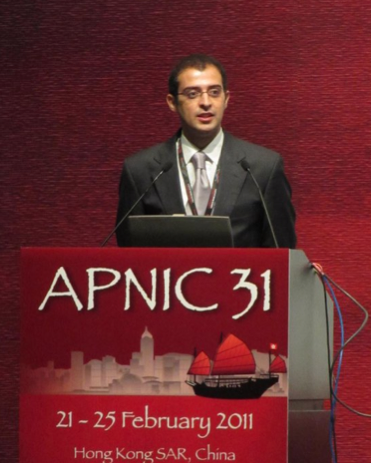Program
Some speakers may opt to present remotely.

Alastair Johnson

Andy Linton
Andy Linton has over 25 years experience in Internet networking. His initial experience was as a researcher and programmer in the university sector at the University of Newcastle upon Tyne and Victoria University of Wellington and then with a number of Internet Service Providers such as AARNet, connect.com.au, Telecom NZ, Netlink, Telstra and CityLink.
Andy has been on the board of the Public Interest Registry which manages the .org domain, the council of InternetNZ and is currently on the board of New Zealand's Domain Name Commission which manages the .nz name space. He is also a trustee of the NZ Network Operators' Group Trust and a member of the program committee for the APRICOT 2011 conference.
Andy has done work for APNIC, RIPE and ICANN building software systems, networks and undertaking structural reviews.
He is one of the 14 global Trusted Community Representatives who oversee the key ceremonies where the cryptographic digital keys used to secure the Internet DNS Root Zone are generated and securely stored.
Andy has travelled as a volunteer on a number of occasions to teach at the PacNOG Internet infrastructure computer workshops in Pacific countries such as Samoa, Vanuatu, Tonga, Fiji, Cook Islands, Solomon Islands, French Polynesia and American Samoa.

Champika Wijayatunga
Champika is the Training Unit Manager of APNIC and responsible for managing the APNIC training activities in the Asia Pacific region. Champika has over 15 years of experience and worked in a number of countries in the IT industry, academia, research, and training environments. He was previously the Team Leader of the APNIC training team, a Senior Training Specialist and also the APNIC Liaison Officer for the South Asia region.
Prior to APNIC, Champika worked as a Research Associate at the Asian Institute of Technology in Bangkok, Thailand. He started his career with IBM as a Systems Engineer and later worked as an IBM Software Systems Specialist. He was also an IBM Instructor, where he conducted various IBM training courses to their clientele.

Dean Pemberton

Donn Lee

Dr Shin Miyakawa
Shin Miyakawa has worked for NTT since 1995 right after he got Ph.D from Tokyo Institute of Technology, moved to Silicon Valley, California since 1997 to 2002 and now is a director of IP technology development team in Tokyo, Japan. He has been working on IPv6 technology since 1996 with various people in and out NTT, WIDE project, software and hardware vendors, network providers and IETF folks like Steve Deering to let IPv6 be commercialized. He wrote seveal RFCs related IPv6 like prefix delegation requirement, IPv6 ADSL specification and so on, and now he is working on Carrier Grade NAT too. He also is now appointed as a Director, Service Strategy, Corporate Planning Division in NTT Communications as a concurrent position and is a visiting professor at Japan Advanced Institute of Science and Technology.

Edwin Purwandesi
Edwin Purwandesi worked for TELKOM Indonesia for 14 years in various roles including:
- TELKOM Dial-up Product Management (2000-2003)
- Technical Coordinator of Speedy Deployment, TELKOM Broadband Access (2004-2006)
- TELKOM Hotspot Product Coordinator (2006-2011)
- TELKOM IPv6 TaskForce member (2006-2011)

Emile Aben
Emile Aben has worked in the RIPE NCC Science Group as a research engineer and system architect since 2009, where his focus is measuring IPv6 deployment. After getting a MSc. degree in Chemistry from the University of Nijmegen Emile worked as web developer, sysadmin, security consultant and researcher. From 2004 to 2009 Emile worked at the Cooperative Association of Internet Data Analysis (CAIDA), where he worked on high speed passive traffic measurements and data collection systems. He is interested in technology changes like IPv6 and DNSSEC deployment.

Erik Kline

Eun-Ju Kim
Dr Kim is currently the Regional Director of ITU Regional Office for Asia and the Pacific based in Bangkok, Thailand, representing ITU, a UN Specialized Agency for telecommunications/ICTs and serving some 40 Member States in this dynamic region.
She has received Masters Degrees in Executive Education from the Seoul National University in R. O. Korea; the London City University in the United Kingdom; and a Ph.D from the Kennedy School at Harvard, USA.
She has been pursuing close cooperation and partnerships in order to serve member economies more effectively and strategically. In particular, for their inclusive and sustainable development of ICTs in different phases through optimizing digital opportunities in the interdependent knowledge society, she has sought Public-Private-Peoples’ Partnerships (4Ps) – with multi-stakeholders such as UN Agencies, international, regional, sub-regional and national organizations, regulators, private industry, development bank, NGOs, and academia in addition to the ITU Administrations.
She has received awards from the Ministers of R. O. Korea (1994) and Mongolia (2001); ITU (2009); and the President of Mongolia (2011).

Gaurab Raj Upadhaya
Gaurab Raj Upadhaya is Network Architect at Limelight Networks based in Singapore.
In this role he works with the team responsible for backbone network of the Limelight Content Delivery Network. Previously, Gaurab worked for Packet Clearing House as Sr. Network Engineer and Internet Analyst managing a global DNS Anycast system spread over sixty sites and supporting eighty plus ccTLDs and gTLDs.
Gaurab's primary interest is in Internet backbone operations, analysing peering/transit relationships between operators and roles of Internet Exchange Points in different parts of Asia. He also spends much of his time in training ISPs in developing countries about best practices on network operations.
Gaurab also serves on the Board of APIA, Program Committee of APRICOT and Program Committee of APNIC meetings. He chairs the South Asian Network Operators Group (SANOG), and the APNIC Policy -SIG. He lived most of his life in Nepal, and setup the Nepal Internet Exchange. He's been active participants at APRICOT since 2002.

Geoff Huston

Hans Liu

Hee Jung Kim
Ms Hee Jung Kim was elected as the youngest member of the National Assembly of Korea in 2004, and was selected as the superb member each year until she finished her service in 2008. She served as the first President of KISA when the organization was consolidated, from 2009-2010. She has served as the spokesperson for the Blue House, the executive office and official residence of the President of the Republic of Korea from July 2010 to June 2011.
Hee Jung earned a bachelor's degree in Political Science and Diplomacy, a Master of Political Science, and a Research Doctorate of Political Science at Yonsei University.

Hisham Ibrahim

Hyun K. Kahng
- Professor, Korea University
- Chair, IPv6 & URI Forum Korea
- Chair, Magnetic Field Area Network Forum Korea
- Head of Delegations, ISO/IEC JTC1 SC6

Izumi Okutani
Izumi Okutani performs Policy Liaison at JPNIC. She is in charge of outreach and training activities for Policy Development in Japan, and she has been involved with coordination between the Japanese and wider Asia Pacific communities since 2000. Izumi has served as NIR SIG Chair since 2005.

Jason Fesler
Previous experiences have included a variety of operational roles, with large scale (100k+) systems management and critical network systems automation; and engineering roles prior to the commercialization of the Internet.
In his off time, he runs test-ipv6.com as a public service.

Ji Young Lee
Ji-Young Lee is a systems engineer at KRNIC. She received her B.S. degree in Computer Science from Ewha Womans University, Korea, in 2003, and her M.S. in Computer Science from Ewha Womans University, Korea, in 2005. Since 2004, she has worked for the Korea Network Information Center (KRNIC) of the Korea Internet and Security Agency (KISA).

Jian Zhang
Jian graduated from Northeastern University, Boston with a M.S degree in Information Systems. Jian's career track included technical and managerial positions at GTE Internetworking, Nextel Communications and Cisco Systems in the US.
With over ten years of studying and working in the US, she has accumulated rich hands-on experience in ICT and networking, excellent cross-cultural communications, and a deep understanding and awareness of cultural diversity.
She was the Director of the International Business and Policy Development department at the China Internet Network Information Center (CNNIC) after she went back to China. During her tenure with CNNIC, she helped CNNIC to re-structure its overseas partnership and made advancements global Internet community participation. In realizing the importance of cultural diversity, she is also one of the key drivers on the IDN ccTLD Fast Track Process. She has been actively involved in IDN policy development in ICANN, and was a member of the IDNC WG in formulating policy proposals for IDN ccTLD Fast Track.
Jian has devoted herself to the global Internet community. She currently serves as a councillor on the CCNSO council, and used to be a board member of the APTLD. She was also Co-Chair of the APNIC Policy SIG, and contributed much to policy development and Internet governance.

Jonny Martin

Judith Duavit Vazquez
Judith Duavit Vazquez, is the founder and Chairman of PHCOLO Inc. the Philippines telecommunications cross-connection site.
In 1994 and at the young age of 32, she laid the first fiber in the Central Business District of Makati Metro Manila and constructed the nation’s first 45-story skyscraper named The Peak. She crowned The Peak with a 15-story telecommunications tower believing then that if broadcast could telecast images and sound, why not data and voice.
It was within The Peak that the first Philippine ISP, Mozcom, was established- as well as the first Internet banking service by Unionbank - among other Internet and IP-Protocol firsts.
Judith’s experience extends into the vast realm of Media. She is the eldest child and only daughter of Gilberto Duavit, owner of the controlling interest in the GMA Network, the Philippines leading broadcast, radio and cable/Internet content provider company. She has served this publicly-traded concern and its subsidiaries as board director for over 20 years and actively participates in governance responsibilities as a member of the Compensation, Audit and Risk Management Committees.
She was married to Juan Miguel Madrigal Vazquez and widowed in August 2009. She has two children: Rosana (24) and Jose Miguel (22). She is an alumna of the University of the Philippines (BSc Economics), Harvard Business School, University of Michigan (Ann Arbor) and the Asian Institute of Management.
Judith was recently elected to the board of ICANN and begins her first term in October.

Keith Davidson

Kilnam Chon
He joined the Korea Institute of Electronics Technology in 1979 to work on computer system development, and moved to Korea Advanced Institute of Science and Technology in 1982 as a professor in the Computer Science Department. He has worked on network systems including the Internet since early 1980s, and contributed to the formation of various regional Internet organizations such as APNG, APAN, and APTLD, of which he is a founding chair. He also co-chairs the Coordination Committee of Intercontinental Research Networking (CCIRN). He also developed the first Internet in Asia, called SDN, in 1982, and organized the first Internet conference called PCCS in 1985.
Mr Chon established a company named Networking, Inc. in 2000 to offer a vision of the information society and infrastructure through incubating companies based on knowledge of and networking with globally competitive technology groups.

Kuo-Wei Wu

Ma Yan

Markus Kummer
Markus Kummer is the Internet Society's (ISOC) Vice President for Public Policy. He has extensive experience with Internet policy at the global, regional, and national levels. Before joining the Internet Society in February 2011, Markus was the Executive Coordinator of the Secretariat supporting the United Nations' Internet Governance Forum (IGF). Previously, Markus held the position of eEnvoy for the Swiss Foreign Ministry in Berne. He was a member of the Swiss delegation during the first phase of the World Summit on the Information Society (WSIS) where he chaired several negotiating groups, including the group on Internet governance. He went on to serve as the Executive Coordinator of the WSIS Working Group on Internet Governance from 2004 to 2005.

Martin Levy

Miwa Fujii
She is responsible for various projects that support the smooth transition to IPv6 including outreach activities to -a wide range of stakeholders.
Miwa regularly represents APNIC’s view on the transition to IPv6 at global IPv6 Summits and Forums, intergovernmental organizations such as APEC, APT, SPC, and other conferences around the Asia Pacific region.

Paul Wilson
Paul Wilson has twenty years’ involvement with the Internet, including over ten years’ experience as the Director General of APNIC. As part of this current role, he represents the activities and interests of the Asia Pacific Internet community in local and global forums related to the development and management of the Internet.
Previously the Chief Executive Officer of Pegasus Networks, the first private ISP established in Australia, Paul also acted as a consultant to the United Nations and other international agencies. As a primary consultant on Internet projects, including the PAN Program with the International Development Research Centre (IDRC), Paul helped to introduce Internet services for the first time in several developing economies.
Paul is a highly respected member of the global Internet community and participates in the following organizations: APIA, APNG, ISIF, NRO, ISOC and dotAsia.

Philip Smith
Philip Smith recently joined APNIC as Learning and Development Director, and previously was with Cisco Systems since 1998. He was part of the Internet Infrastructure Group in CTO Consulting Engineering.
Prior to joining Cisco, he spent five years at PIPEX (now part of UUNET's global ISP business), the UK's first commercial Internet Service Provider. He was one of the first engineers working in the commercial Internet in the UK, and played a key role in building the modern Internet in Europe.

Ping Wong
Before joining ISOC HK, Ping served as the Senior Business Development Manager of DotAsia Organisation for more than 4 years. Ping was responsible for the planning and execution of marketing programs, coordinating business partner relationships, identifying and developing business opportunities, and strategies for the organization.
Ping has been working as a marketing professional in the information technology and telecommunications industry since 1999. Ping worked with various information technology or telecommunications companies in Hong Kong such as Hutchison Global Communications, Pacific Century CyberWorks and HKNet.

Pitoon Piluwasandhalai

Sala
She is also a member of Global Leadership Interlink (GLI) at the Fiji chapter in Fiji. GLI is a sector of Congress WBN, a synergy of global initiatives focused on effecting humans, social and national transformation through the propagation of values development principles, patterns and approaches.
Having lived and worked in the Pacific, in the private sector, public sector and a regional organization, she is familiar with the development challenges and issues that affect the Pacific. Sala is passionate about collaborating to create synergistic creative solutions.

Sanjaya
Sanjaya is the APNIC Services Director and a member of the APNIC Executive Team.
He has 25 years experience in computer and information technology, starting his career in 1984 with IBM, Indonesia. Ten years later, in 1994, he established the first commercial ISP in Indonesia, IndoInternet, and became its President Director until 2000. He was actively involved with the development of the Internet in the region and became the Indonesia ISP Association Secretary General in 1999. He also served as a member of the APNIC Executive Council in 1996.

Simon Suh
Mr. Simon (Jong Ryeol) Suh is currently President of the Korea Internet and Security Agency (KISA) based in Seoul, Republic of Korea.
He earned a bachelor's degree in Economics and Finance at Yeungnam University and an MBA from Yonsei University. Before joining KISA, he had consecutively filled several posts such as researcher at Electronics and Telecommunications Research Institute, principal member at Ssangyong Economic Research Institute, Vice President at SK Telecom Commerce Division, President at Biztalent Co., principal member at Yonsei University IT Policy Strategic Research Institute, and Executive Vice President at Korea Telecom Media Business Unit.
For current posts, he also serves as principal member at National Economic Advisory Council and Vice President at Korea Smart TV Forum Association as well as President at Korea Internet and Security Agency.

Srinivas (Sunny) Chendi
Srinivas Chendi is APNIC's Senior Community Engagement Specialist and Liaison Officer for the South Asia region. He is responsible for maintaining and enhancing the levels of engagement and participation of the members of the community which APNIC serves. He also manages the South Asia region Liaison role while establishing partnerships with external organizations to encourage IPv6 deployment and help the community derive the maximum benefit from developments at APNIC.
Srinivas has worked in a variety of roles at APNIC and elsewhere, including External Relations Manager, Policy Development Manager, Online Services Manager, Internet Resource Analyst, Technical Support Supervisor, and Systems Security Analyst.
Srinivas represents APNIC at an economy and regional level and is constantly on the lookout for opportunities to collaborate with the Asia Pacific community.
Terence Zhang
Terence Zhang has more than 10 years' experience in service provider networking solution design and technical support. He began his career in the IBM networking department, and he has worked for RCN telecommunication corporation as a network engineer and at Grandcycle Technology as a network consultant.
Terence has participated in the network architecture design and operations of several service providers in both China and the United States. He has a solid understanding of business models and computer applications for various kinds of customers, especially in the IDC, ISP, and telecom industry.
He has detailed knowledge of IP Address Planning, Internet routing architecture, Service Provider network design, and operations. After joining CNNIC, Terence Zhang has been working in the IP resource allocation and policy research areas.

Tomoya Yoshida
Tomoya Yoshida worked at OCN, NTT Communications as an ISP backbone design engineer. He is now at Internet Multifeed since Aug 2011. Tomoya is an industry leader in the field of Internet backbone management, Internet resource management, and routing security.
He was in charge of Internet backbone operation and peering coordination at OCN. He launched theInternet Routing Registry (IRR) service at NTT in 1999 (currently merged to the Verio Routing Registry). He also focuses on development of the Internet, especially in the field of routing and IP address management in addition to his operational responsibilities.
Tomoya also has been the core member of the NOC team of the Interop Tokyo since year 2000. Also, he has contributed to the routing security area by serving as the nsp-security-jp moderator in Japan since 2004. He is the founder of IRS (Inter-domain Routing Security) Workshop, that was created for sharing inter-domain security-related information among ISPs.

Tony Hill

Yanghee Choi

Yong Sup Shin

Zhao Wei
Zhao Wei received her Masters degree in Electronics Engineering from the University of Nottingham. She joined the China Internet Network Information Center (CNNIC) in 2007. She is currently the leader of the IP group and her responsibilities include IP address allocation, policy research, and external community liaison.
